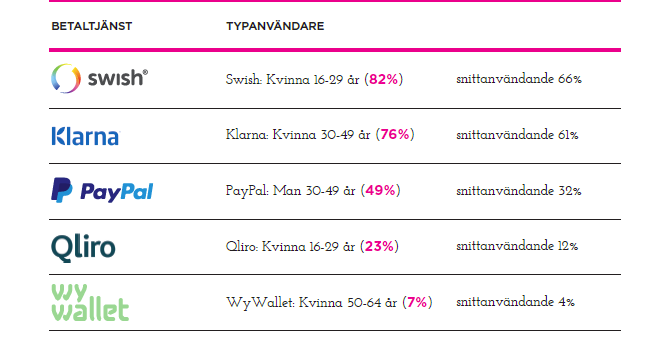12/20/2016 Each year Insight Intelligence reports on Swedes' views on payments in its "Sweden Pays" survey. This year they report on Swedish views on new and digital technology and how Swedes would prefer to pay in the future. "Sweden Pays 2016" was conducted in collaboration with IIS, Visa Europe, SEQR and Bankgirot.
Trends
In 2013 Swedes were frustrated with restrictions on the use of cash in society. By 2014 this frustration had turned the other way, focused on being forced to pay cash, which was seldom carried. The year 2015 saw the "Swish effect" and there was much talk about mobile phones being the most common means for payments between friends.
In 2016, we have become more mobile. We have increased our trust and use of app payments. New technology offers new opportunities and new regulations remove barriers previously created by geography and currency. The trend is: everything, everywhere, right now!" says Håkan Ygberg, Head of Business Development at Bankgirot.
Summary of the report
Attitudes to payments in 2016
Development towards an increasingly cashless society continues and the differences between the generations in payment habits and preferences are considerable. Older people outside the cities are most keen to use cash while young people in the cities prefer to use new digital payment services.
Of the five most popular payment services, Swish still tops them all for usage. 66% of respondents stated that they use Swish and the share of users has grown by 47 percentage points over the previous year.
61% report that they use Klarna and 32% say that they use PayPal. Qliro is new to the market (2015) and has already surpassed WyWallet in market share measured in users.

Swedes preferences
Payment services should be fast, convenient, easy and safe to use! The definition of what is fast, convenient, easy and safe varies depending on who you ask, and influences people's preferred services.
...and trust
We are moving towards a cash-free society and trust, primarily among younger people, in digital payment services has increased by 43 percentage points in three years. Cash is more popular among older men aged 65-74 years (20%) than among men aged 16-29 years (3%). 90% of young women have a BankID, compared to 52% of older people.
However, trust in cash remains high (87%). On the other hand, trust in invoice payments is falling and digital online currencies are hardly used due to little trust in their security.
Respondents also expressed concern about new and digital payment methods. The root causes of this concern include a lack of understanding about new payment methods and not knowing where the money goes.
The future – what we believe and want
Respondents to the survey believe that in ten years we will pay by card for the most part, and this is also what they want. Swedes also believe in, and are interested in, paying via payment apps or contactless solutions, that is, wave to pay. Only willingness to pay cash (9%) is higher than the belief (4%) that we will be able to pay cash in ten years.
Many responded that they have difficulty predicting the technical developments, political decisions, data security and so on needed to envision future payment methods. It is primarily young people that are positive towards and aware of new payment methods.
A conclusion
Different payment methods have long been associated with different situations. Bankgirot see a change in this behaviour:
We can see that these associations between payment method and situation are starting to fade. Consider, for instance, the increasing acceptance of mobile payments and cards, especially among younger people and in cities, which is leading to cash becoming less viable. In Sweden, this is largely being driven by the Swish application and payment cards, although development is also being driven by mobile solutions popping up in many areas of life and in industries exposed to new competitors," says Håkan Ygberg
You can read more about Swedish attitudes to payments in the report. Click the link on the right to download the entire report Sweden Pays 2016 (only available in Swedish).